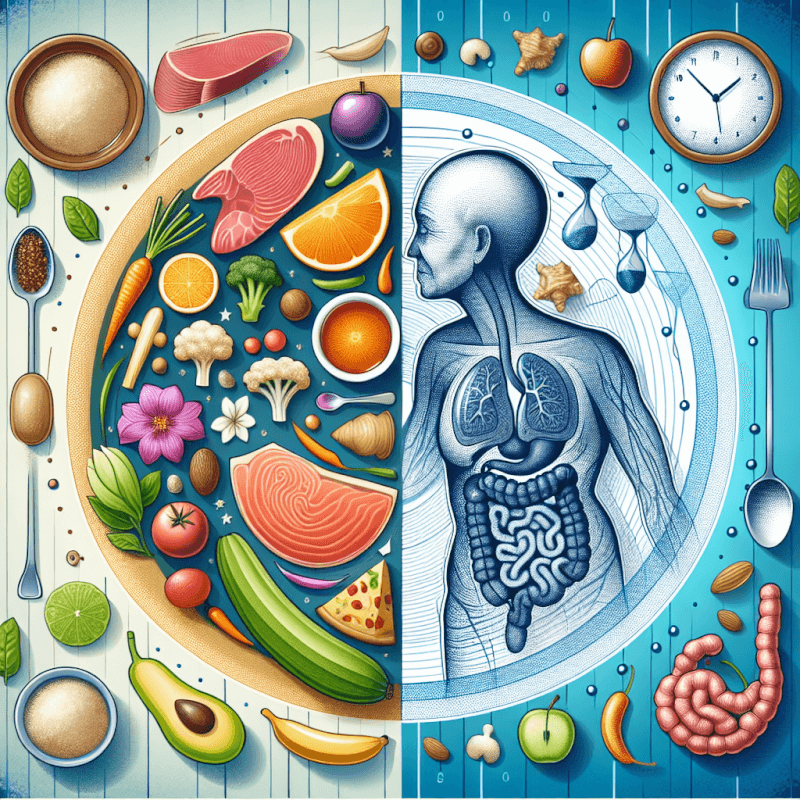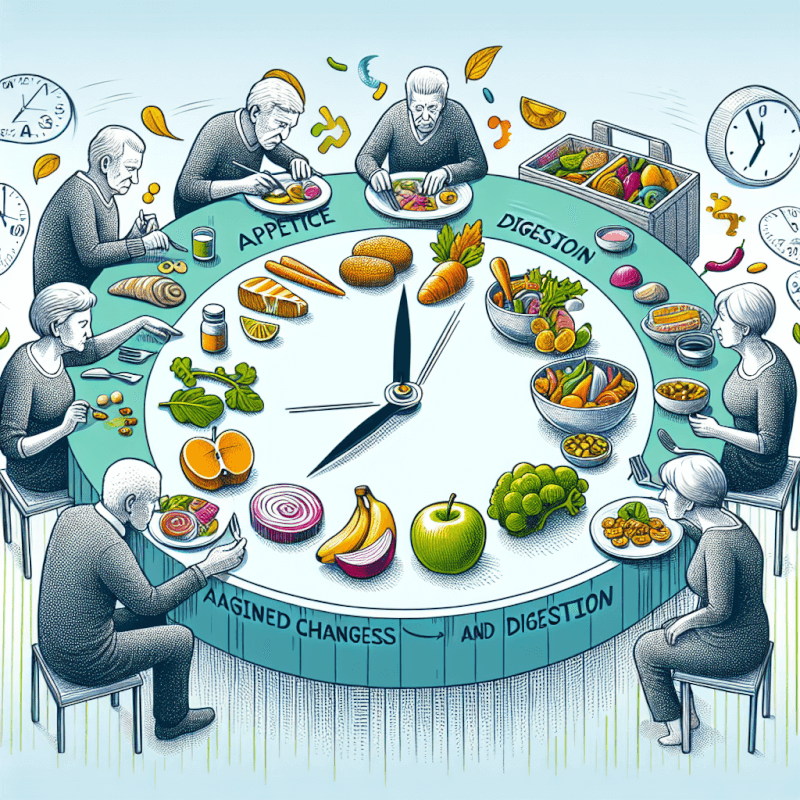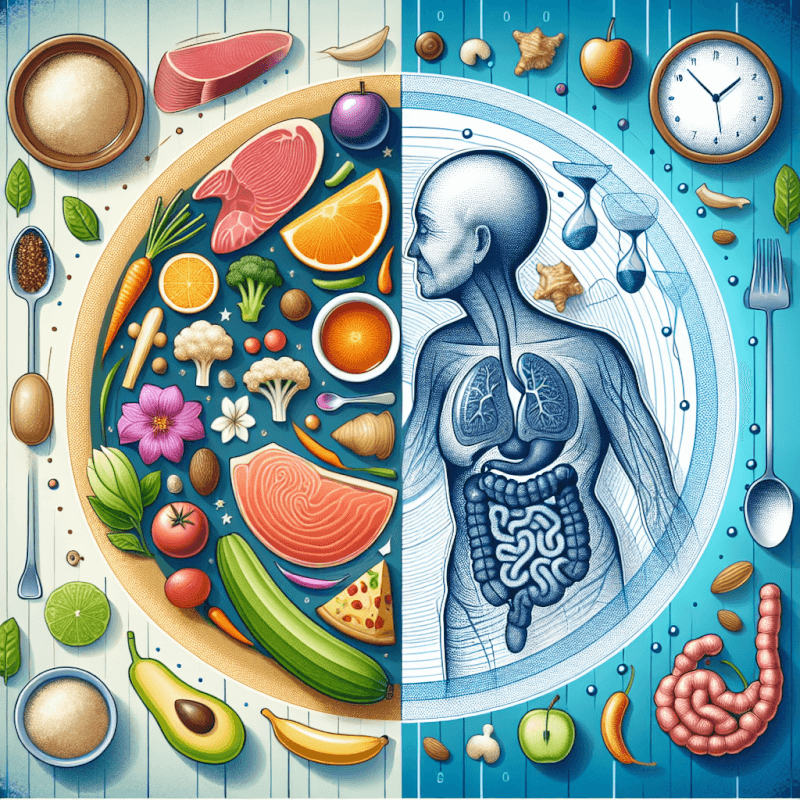As we age, changes in appetite and digestion can become a common concern for many individuals. The way our bodies process and absorb nutrients can shift, leading to potential discomfort or a decrease in appetite. However, the good news is that by making thoughtful alterations to our diet, we can effectively address these changes and support our overall well-being. In this article, we will explore various strategies and tips to help you navigate through these shifts with ease and maintain a healthy and satisfying relationship with food.

Understanding Changes in Appetite and Digestion with Age
As you age, it is common to experience changes in appetite and digestion. These changes can be influenced by several factors, including hormonal changes, decreased physical activity, and changes in taste and smell. Understanding these factors and their impact on your body can help you make informed choices to maintain a healthy and balanced diet.
Factors Affecting Appetite and Digestion
Several factors can contribute to changes in appetite and digestion as you age. Hormonal changes, such as a decrease in estrogen or testosterone levels, can affect your hunger and satiety cues. Additionally, a decrease in physical activity level can slow down your metabolism and make it harder to maintain a healthy weight.
Changes in taste and smell can also have a significant impact on appetite. As you age, you may notice a decreased ability to taste certain flavors, which can make food less appealing. Similarly, changes in smell perception can affect your overall enjoyment of meals.
Role of Aging in Appetite and Digestion Changes
Aging itself plays a role in the changes you may experience in appetite and digestion. As you age, your body goes through a natural process of slowing down. Your digestive system may become less efficient, and the production of digestive enzymes may decrease. This can lead to slower digestion and absorption of nutrients.
Furthermore, the muscles in your digestive tract may weaken, which can contribute to issues such as constipation or gastroesophageal reflux disease (GERD). The aging process can also affect the functioning of organs involved in digestion, such as the liver and gallbladder.
Common Challenges Faced with Aging and Diet
Several common challenges are faced when it comes to aging and maintaining a healthy diet. It is not uncommon to experience a decrease in appetite, which can lead to unintentional weight loss or malnutrition. Similarly, some individuals may face an increase in appetite, leading to weight gain or the development of chronic conditions such as obesity.
Digestive issues, such as constipation or acid reflux, can also become more common as you age. These issues can affect your quality of life and make it more difficult to consume a varied and balanced diet.
Nutritional Requirements for Healthy Aging
To address changes in appetite and digestion as you age, it is essential to understand the nutritional requirements for healthy aging. It is important to ensure that you are consuming enough calories to meet your energy needs while also maintaining a balanced intake of essential nutrients.
Caloric Needs and Metabolism in Older Adults
Your caloric needs and metabolism may change as you age. Generally, older adults require fewer calories than younger adults due to a decrease in basal metabolic rate. However, individual variations based on activity level, body composition, and overall health should be taken into account.
To maintain a healthy weight, it is crucial to find the right balance between calorie intake and physical activity. Regular exercise can help increase your metabolism and offset any decline in caloric needs.
Essential Nutrients for Healthy Aging
As you age, it becomes even more important to pay attention to the nutrients you are consuming. Essential nutrients for healthy aging include protein, fiber, vitamins, and minerals.
Protein is crucial for maintaining muscle mass and strength, which can help prevent muscle loss and frailty. Good sources of protein include lean meats, poultry, fish, eggs, dairy products, legumes, and nuts.
Fiber is essential for maintaining regular bowel movements and preventing constipation. It can also help lower cholesterol levels and control blood sugar levels. Whole grains, fruits, vegetables, legumes, and nuts are all excellent sources of fiber.
Vitamins and minerals play a vital role in maintaining overall health and wellbeing. Fruits, vegetables, whole grains, lean meats, and dairy products are rich sources of essential vitamins and minerals.

Strategies to Address Changes in Appetite
To address changes in appetite, it is important to develop strategies that promote mindful eating and ensure adequate intake of nutrients.
Eating Mindfully and Listening to Hunger Cues
Practicing mindful eating can help you better understand your body’s hunger and fullness cues. Take the time to savor each bite, pay attention to the flavors and textures of your food, and eat slowly. Being mindful allows you to enjoy your meals more fully and may help prevent overeating.
Listening to your body’s hunger cues is crucial. Eat when you are hungry and stop when you are comfortably full. Avoid eating out of boredom or as a response to emotions.
Maintaining a Regular Eating Schedule
Establishing a regular eating schedule can help regulate your appetite and digestion. Aim to have meals and snacks at consistent times throughout the day. This routine can help keep your metabolism steady and prevent extreme hunger or overeating.
Enhancing Food Flavors and Textures
Changes in taste and smell perception can make food less appealing. To enhance the flavors and textures of your meals, experiment with herbs, spices, and seasonings. Adding a variety of colors and textures to your plate can also make your meals more visually appealing.
Ensuring Sufficient Hydration
Proper hydration is essential for good digestion and overall health. As you age, your sense of thirst may decrease, making it easier to become dehydrated. Aim to drink an adequate amount of water throughout the day and include hydrating foods such as fruits and vegetables in your diet.
Optimizing Meal Presentation
Making your meals visually appealing can help stimulate your appetite. Pay attention to how your food is presented on the plate. Experiment with different colors, textures, and arrangements to make your meals more enticing.

Dietary Approaches to Support Digestion
To support healthy digestion, it is important to make dietary choices that promote regular bowel movements and prevent digestive issues.
Increasing Fiber Intake
Fiber is essential for promoting healthy digestion. It adds bulk to the stool, helps regulate bowel movements, and can prevent constipation. Increase your intake of fiber-rich foods such as fruits, vegetables, whole grains, legumes, and nuts.
Choosing Nutrient-Dense Foods
Opt for nutrient-dense foods that provide a high concentration of essential vitamins and minerals. These foods can support overall health and wellbeing. Include a variety of fruits, vegetables, whole grains, lean proteins, and healthy fats in your diet.
Incorporating Probiotics and Fermented Foods
Probiotics are beneficial bacteria that can support gut health. Consuming foods such as yogurt, kefir, sauerkraut, and kimchi can introduce healthy bacteria into your digestive system and promote proper digestion.
Maintaining Adequate Fluid Intake
Adequate fluid intake is crucial for maintaining good digestion. Water helps keep stool soft and prevents constipation. Aim to drink enough water throughout the day, and include hydrating foods such as soups, smoothies, and juicy fruits in your diet.
Limiting Processed and High-Fat Foods
Processed and high-fat foods can be harder to digest and may contribute to digestive issues. Limit your intake of foods that are high in added sugars, unhealthy fats, and artificial ingredients. Instead, focus on whole, unprocessed foods that are easier for your body to digest.

Modifying the Diet for Specific Digestive Issues
Certain digestive issues may require specific dietary modifications to manage symptoms and promote gut health.
Addressing Reduced Stomach Acid
If you experience reduced stomach acid production, you may benefit from including fermented foods, apple cider vinegar, or digestive enzyme supplements in your diet. These can help improve digestion and nutrient absorption.
Managing Constipation and Bowel Irregularities
To manage constipation and bowel irregularities, increase your fiber intake and drink enough water. Regular exercise can also help promote healthy bowel movements. In some cases, a stool softener or fiber supplement may be necessary under the guidance of a healthcare professional.
Dealing with Gastroesophageal Reflux Disease (GERD)
If you have GERD, it is important to avoid triggering foods and beverages such as citrus fruits, spicy foods, fatty foods, and caffeine. Eating smaller, more frequent meals and avoiding lying down immediately after eating can also help manage symptoms.
Adjusting Diet for Diverticulosis or Diverticulitis
For individuals with diverticulosis or diverticulitis, it is important to increase fiber intake gradually to avoid exacerbating symptoms. Including foods with soluble fiber, such as oatmeal, beans, and lentils, can help soften stool and promote regular bowel movements.
Managing Lactose Intolerance or Food Sensitivities
If you have lactose intolerance or food sensitivities, it is crucial to identify and avoid trigger foods. There are many lactose-free or dairy-free alternatives available in the market that can help you meet your nutrient needs without discomfort.

Seeking Professional Guidance and Support
If you are facing challenges with appetite and digestion or have specific dietary requirements, it is advisable to consult a registered dietitian. A dietitian can provide personalized guidance and help you create a diet plan that meets your individual needs and goals. They can also assist in addressing any nutrient deficiencies and ensuring you are getting proper nutrition.
Considering Nutritional Supplements
In some cases, nutritional supplements may be necessary to meet your nutrient needs. Your healthcare professional or dietitian can help determine if supplements are appropriate for you and recommend the right ones based on your specific needs.
Remember, making informed choices about your diet and seeking professional guidance can go a long way in addressing changes in appetite and digestion as you age. By implementing these strategies and maintaining a balanced diet, you can support your overall health and wellbeing.


